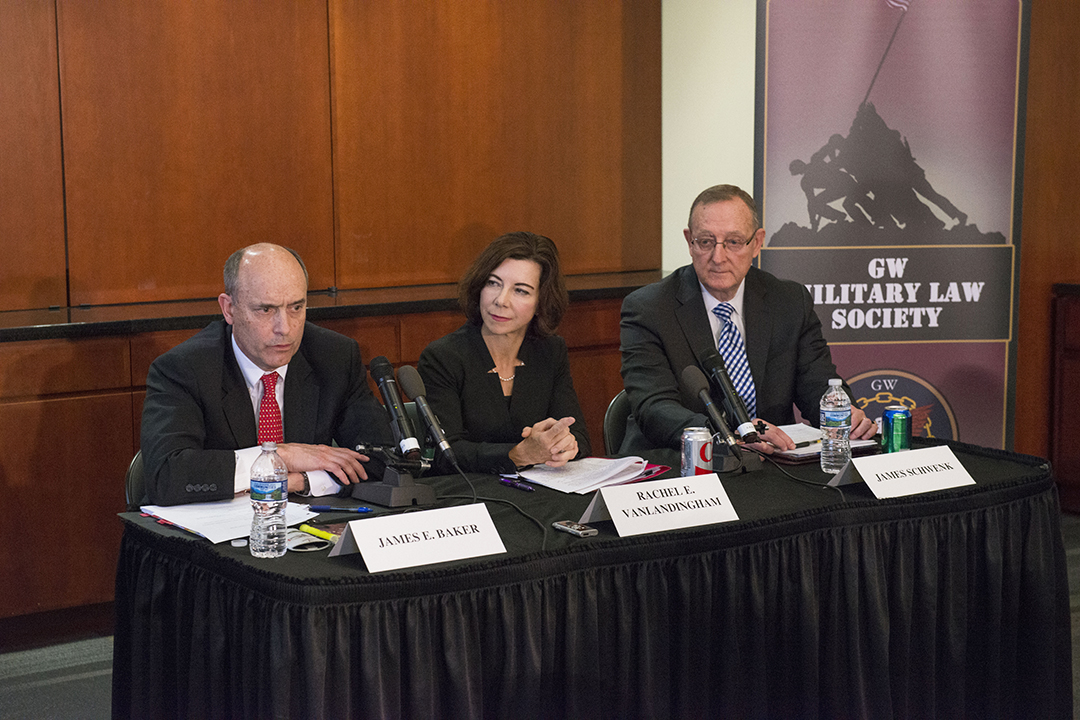GW Law and the American Bar Association (ABA) recently hosted a panel discussion, "Free Speech and Sexual Cases," which brought retired military officials and legal academics to discuss the military's enforcement of rules as they apply to free speech and sexual harassment. The event was televised live on C-SPAN. Panelists included the Hon. (ret.), Chief Judge, U.S. Court of Appeals for the Armed Forces and Chair, ABA Standing Committee on Law and National Security, James E. Baker; Brig. Gen. (ret.), USMC, James Schwenk; and Lt. Col. (ret.), USAF, Associate Professor of Law at Southwestern Law School, Rachel VanLandingham. The discussion was moderated by Professor Gregory E. Maggs.
A discussion on free speech and sexual harassment cases involving service members comes at a pivotal time. Although this is not a new issue in the United States Armed Forces, it has come to the forefront again with the recent allegations of widespread misconduct within the Marine Corps; in particular, the use or misuse of social media to post and share nude photographs.
On March 17, the Marine Corps issued a longer and more detailed social media policy in which they said, in part, "Marines must never engage in commentary or publish content on social networking platforms or through other forms of communication that harm good order and discipline, or that bring discredit upon themselves, their unit, or the Marine Corps."
Professor Maggs quoted Time magazine in which they responded to the policy, saying, "The new policy makes it clear at how existing rules and the Uniform Code of Military Justice can be used to prosecute offensive, indecent, or disrespectful online activities. But it creates no new laws, underscoring the legal quagmire posed by the internet and the constraints on military leaders posed by privacy laws and the First Amendment right of free speech."
According to Professor Maggs, free speech has limits; however, what are those limits? He raised awareness to the following questions: Are there differences between service members and civilians? Can speech be more tightly restricted among service members, and if so, what are those restrictions? Panelists addressed these issues and the tensions that can exist between protecting free speech and preserving good order and discipline.
Judge Baker's remarks included an explanation of how the government might have a compelling interest in restricting speech by service members that could lessen confidence in the military or discourage recruiting. Professor Vanlandingham insisted that leaders should be held accountable if they fail to prevent hostile environments, and she called for the Secretary of Defense to take action against the Commandant of the Marine Corps. General Schwenk discussed how the military might look for administrative solutions, rather than criminal prosecutions, to avoid some First Amendment issues.
This event was organized by Lisa M. Schenck, Associate Dean for Academic Affairs, who also teaches Military Justice at GW Law. It was sponsored by the ABA Standing Committee on Armed Forces Law and the ABA Standing Committee on Law and National Security. It was also co-sponsored by three GW Law School organizations: the National Security & U.S. Foreign Relations Law LL.M. Program, the Military Law Society, and the National Security Law Association.


